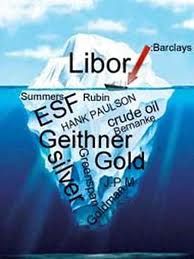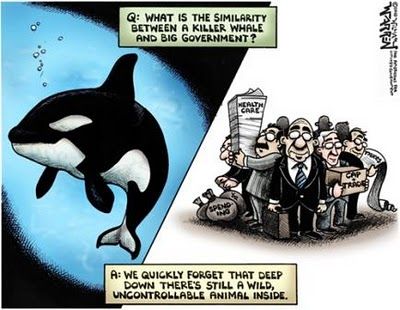Cross posted from The Stars Hollow Gazette
With sequestration looming, many Americans are still struggling to recover from the the 2008 recession that cost them billions in lost savings and jobs but not the banks who were the chief perpetrators for the housing crash. As a matter of fact, American tax payers are still bailing out the “Too Big To Jail” banks $83 billion a year:
So what if we told you that, by our calculations, the largest U.S. banks aren’t really profitable at all? What if the billions of dollars they allegedly earn for their shareholders were almost entirely a gift from U.S. taxpayers? [..]
Banks have a powerful incentive to get big and unwieldy. The larger they are, the more disastrous their failure would be and the more certain they can be of a government bailout in an emergency. The result is an implicit subsidy: The banks that are potentially the most dangerous can borrow at lower rates, because creditors perceive them as too big to fail. [..]
The top five banks — JPMorgan, Bank of America Corp., Citigroup Inc., Wells Fargo & Co. and Goldman Sachs Group Inc [..] with almost $9 trillion in assets, more than half the size of the U.S. economy — would just about break even in the absence of corporate welfare. In large part, the profits they report are essentially transfers from taxpayers to their shareholders.
It is outrageous that Americans are being bludgeoned with $85 billion in austerity cuts that will most likely halt any recovery while handing banking shareholders an $83 billion gift.
During his appearance before the Senate Banking Committee, Federal Reserve Chairman Ben Bernanke was asked by freshman Sen. Elizabeth Warren about about the risks and fairness of having banks that are “too big to fail”
Warren quizzed Bernanke on that study. “I understand that we’re all trying to get to the end of too big to fail, but my question, Mr. Chairman, is until we do, should those biggest financial institutions be repaying the American taxpayer that $83 billion subsidy that they’re getting?”
Bernanke responded, “The subsidy is coming because of market expectations that the government would bail out these firms if they failed. Those expectations are incorrect.”
After some back and forth, Warren countered, “$83 billion says there really will be a bailout for the largest institutions.”
“That’s the expectation of markets. But that doesn’t mean we have to do it,” Bernanke responded.
Warren insisted that the large banks should pay for the subsidy. “Ordinary folks pay for homeowners’ insurance, ordinary folks pay for car insurance, and these big financial institutions are getting cheaper borrowing to the tune of $83 billion in a single year simply because people believe that the government would step in and bail them out. I’m just saying, if they’re getting it, why shouldn’t they pay for it?” she said.
“I think we should get rid of it,” Bernanke said. He said he agreed with her that government should address the problem of “too big to fail.”
Meanwhile, as Chris in Paris at AMERICAblog points out these banking executives are the forefront of the attack on the social safety net:
You may recall Goldman Sachs CEO Lloyd Blankfein, the guy who Obama has a strange bromance with, adjusted bonus payout dates in both the US and UK to avoid paying taxes. You know, as in the taxes that saved his entire lifestyle.
Even worse is Blankfein’s insistence on bashing programs that are critical to middle class Americans. It’s the Blankfeins of the world that want to take your Medicare and Social Security away. God forbid we ran out of money and there weren’t any left to bail out the banks next time, right?
Then there’s my other favorite bankster, good old Jamie Dimon of JPMorgan. Dimon is the delightful fellow who ignored the warnings and ended up costing the bank, and our taxpayers, billions.
Since these banks really aren’t turning a profit without government welfare, what would JPMorgan look like without those handouts? For Dimon, banking rules that help protect taxpayers from bailing out the gambling banks are “un-American.”
The major bank chiefs have been quite vocal about trashing the social system, just as they trashed our economy. But when it comes to helping Americans, the banks have little interest beyond their next bailout.
Speaking of Jamie, our favorite vampire capitalist, “thoughtfully” explained why he’s richer than anyone else” in this exchange with Mike Mayo, an analyst at CLSA and Dimon critic:
Mayo: I think what I hear UBS saying in the presentation is that if I’m an affluent customer I’ll feel a lot better going to UBS if they have 13.5 (percent) capital ratio than another big bank with a 10 percent ratio. Do you agree with that?
Dimon: You would go to UBS and not JPMorgan?
Mayo: I didn’t say that. That’s their argument.
Dimon: That’s why I’m richer than you. [..]
FDL New Desk‘s DSWright found Dimon’s response arrogant but indicative of something even more offensive:
Dimon is right, he did get rich having low capital ratios – which is why his form of banking is dangerous. It’s the precise reason the banks could not protect themselves during the crisis, they were over-leveraged.
“The real issue isn’t who is rich, but rather whose interests are being fairly served and whose aren’t. Dimon’s approach gives short shrift to both shareholders and taxpayers. Taxpayers still carry substantial risks for which they are not being compensated, a state that will only change when regulations are tightened, and hopefully vastly simplified.
Shareholders do badly because the kind of bank Dimon runs is prone to loss and volatility, leading markets to set a low value on the bank’s earnings.”
Mathematician Albert Einstein said that doing the same thing over and over expecting different results was the definition of insanity. Continuing to bail out these banks on tax payer’s “dime” when there is no evidence that breaking them up would harm the economy is just insane.


 That $2 billion
That $2 billion